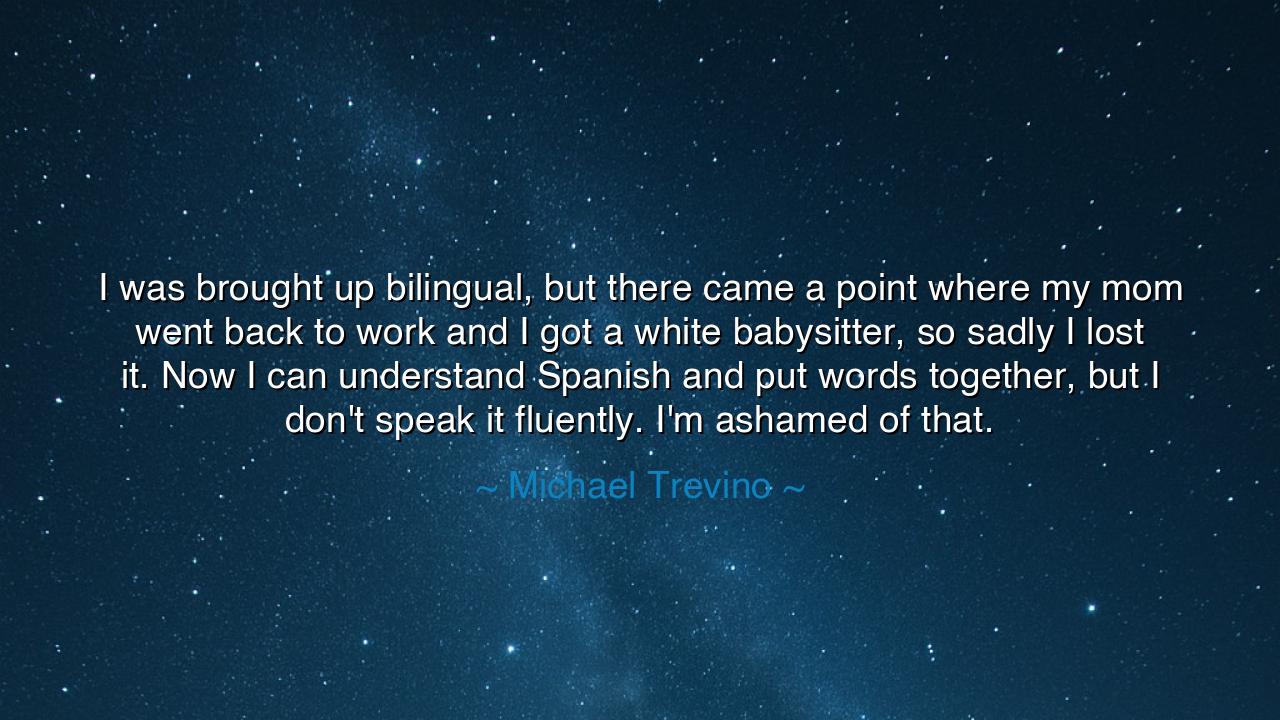
I was brought up bilingual, but there came a point where my mom
I was brought up bilingual, but there came a point where my mom went back to work and I got a white babysitter, so sadly I lost it. Now I can understand Spanish and put words together, but I don't speak it fluently. I'm ashamed of that.






When Michael Trevino said, “I was brought up bilingual, but there came a point where my mom went back to work and I got a white babysitter, so sadly I lost it. Now I can understand Spanish and put words together, but I don’t speak it fluently. I’m ashamed of that,” he spoke a quiet grief known to many — the sorrow of losing one’s mother tongue. His words are not merely about language; they are about identity, belonging, and the fragile thread that ties us to our origins. In his voice, one can hear not only the echo of forgotten words, but the longing to reclaim a part of himself that was once whole.
In the wisdom of the ancients, language was seen as a sacred inheritance — not just sound and symbol, but the breath of ancestry. To speak one’s native tongue was to honor those who came before, to call forth the memories of the land and the heart. When Trevino speaks of losing Spanish, he is describing a rupture in that lineage — a small death of connection. His mother, the first keeper of his culture, passed on what she could; but when the rhythm of life changed, when she returned to work, that connection began to fade. The world around him, shaped by another culture and another tongue, began to overwrite the music of his childhood.
The origin of this quote lies in Trevino’s reflections on growing up Mexican-American in the United States, caught between two languages and two worlds. His mother’s Spanish carried the intimacy of love and home, while English became the language of school, work, and assimilation. This story is shared by countless children of immigrants — those who, in striving to fit into the dominant culture, unintentionally lose pieces of the one that raised them. What he expresses as “shame” is not failure, but mourning: mourning for the distance between generations, for the moments when translation becomes a wall instead of a bridge.
In ancient times, the loss of language was seen as the loss of memory itself. The poet Ovid, when exiled from Rome, wrote that what pained him most was not distance, but the erosion of his Latin tongue. Surrounded by people whose words he could not fully grasp, he felt himself fading — not physically, but spiritually. His grief was not unlike Trevino’s, who, though surrounded by English, feels the silence of what is missing. For a person’s first language is more than grammar; it is the heartbeat of their childhood, the sound of their mother’s laughter, the tone of her comfort. To lose it is to lose a dialect of the soul.
And yet, there is hope in Trevino’s confession. He still understands Spanish. He can “put words together.” The bridge is damaged, but not destroyed. The shame he feels can be transformed into purpose — the yearning to reclaim what was lost. The ancients would say that what is forgotten is not gone; it merely sleeps, waiting to be awakened through practice, reverence, and time. To return to one’s language is not only an act of learning; it is an act of healing, a reconnection with the self that was once silenced by circumstance.
From Trevino’s story, we are reminded of a greater truth: that language is not only communication, but inheritance. It carries within it the gestures, humor, wisdom, and spirit of a people. To lose it is to lose part of who we are — but to recover it, even partially, is to resurrect a lineage within ourselves. Those who have drifted from their ancestral tongues should not carry shame, but rather courage — for the path of return is one of devotion, not perfection.
So, my listener, let this teaching be etched upon your heart: protect your roots, even as you grow toward new skies. If you have lost your native tongue, seek it again. Listen to your elders. Learn their words, even if imperfectly. Speak them aloud, even if haltingly. For each syllable is a thread that ties you to the vast tapestry of those who came before you. And if you are a parent, speak your language to your children; give them the gift of dual belonging, that they may carry both the old world and the new within them.
For as Michael Trevino reminds us, the loss of language is never just about words — it is about love, memory, and the inheritance of identity. Yet even in that loss lies a seed of awakening. For what has been forgotten by the tongue can still live in the heart, waiting to be spoken again into the light.






AAdministratorAdministrator
Welcome, honored guests. Please leave a comment, we will respond soon